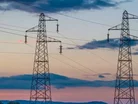UK readies for rough winter following National Grid fire

After a questionable Summer, the UK is now heading into its cold season. And as Christmas decorations begin to - controversially - appear on shop shelves and festive excitement begins to stir, the UK may be in for a bit of a bumpy ride. A National Grid fire has roused concerns over potential winter blackouts and a surge in energy prices, causing a sense of rising anxiety among businesses and families still recovering from the effects of the pandemic.
The site fire in Sellindge, Kent, has resulted in the France-Angleterre power interconnector between the UK and France being shut off, triggering a sharp increase in energy costs throughout the country.
UK energy predicted to take a knock as cable cuts out
Timing isn’t ideal. Along with a looming winter comes record levels of UK inflation, mounting prices on power, and rising food and commodity prices due to supply chain shortages caused by Covid-19 disruptions and Brexit.
But why are energy prices skyrocketing? Well, with the interconnector offline until September 25, 2021, only half of its gigawatt capacity will be available until March next year, threatening the increased chance of winter blackouts.
Prior to the grid fire, there were still rising concerns over the UK’s energy supply throughout this year’s winter, following a less than confident report published by the National Grid in July. According to the report, several power stations including Hunterston B nuclear power station, and Sutton Bridge gas power station, would fail to be available over the full course of the winter period, greatly weakening the UK’s sources of energy.
Winter is coming, and the UK’s energy supply looks precarious
The cost of electricity on the day-ahead market soared to £2,500.01 per MWh for delivery between 7 pm and 8 pm o the N2EX exchange, resulting in a £434.61 average daily price. In comparison to August’s £106.83 average, it’s a significant increase.
“If we don’t start to remedy the situation, we are going to be facing blackouts this winter,” said Catherine Newman, Chief Executive Officer of Limejump Ltd, when speaking to Bloomberg TV. “If things don’t start to reverse soon, we will see the industry getting turned off across the board.”
Henry Edwardes-Evans, an Energy Analyst at S&P Global Platts, told the Evening Standard that the energy concerns are only part of the growing anxiety.
“It’s not hugely material, but it just added to the panic in the market yesterday,” he said, discussing the cable knockout. “There will be enough electricity, it’s just at what cost.
“You will probably see factories ramping down just because of the high cost of power.”
Featured Articles
SAP has announced it has appointed a new President for a newly-created EMEA region, aiming to make the most of the opportunities of cloud and AI technology
Technology giant SAP has expanded its portfolio with the acquisition of LeanIX, a leader in enterprise architecture management (EAM) software
To help businesses achieve increased productivity, Siemens and Microsoft are deepening their partnership by showcasing the benefits of generative AI

